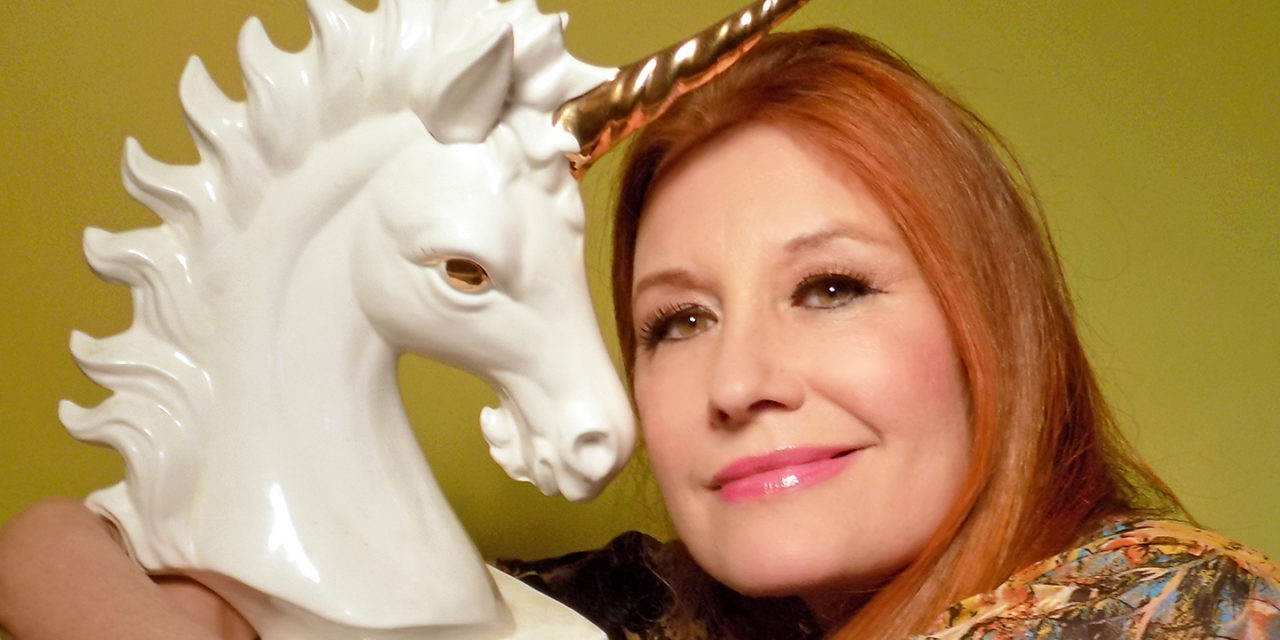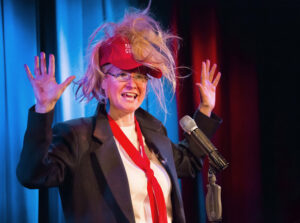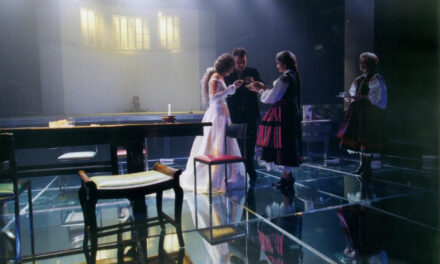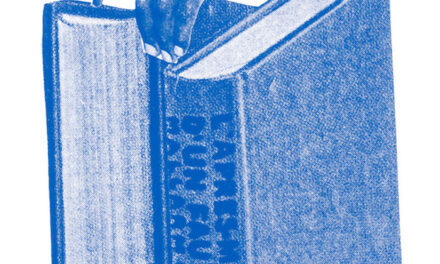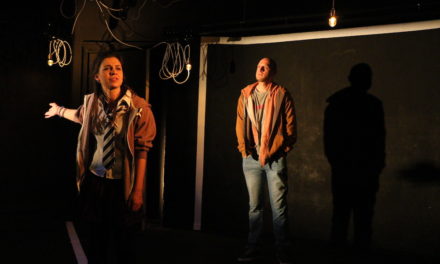Unicorn Gratitude Mystery, July 31-August 21, The Laurie Beechman Theatre, New York City
The unicorn: a mythical creature so ferocious, so wild that it can only be tamed by a virgin pure of body and mind. Karen Finley is something of a unicorn. She has never encountered a virgin.
Instead, over the course of a career spanning over thirty years, Finley has served as a projection screen for Americans’ most outlandish fantasies and inchoate rage. It’s no wonder she feels enough of an affinity with both Hillary Clinton and Donald Trump to ventriloquize them as compellingly as she does in her most recent performance piece Unicorn Gratitude Mystery, a provocative triptych combining Finley’s singular talent for slippery polyphony with the human accouterments of the 2016 presidential election cycle. Trauma, both personal and collective, has always been one of Finley’s great subjects, and there has been no election in recent memory in which we have seen the personal and the political as bizarrely, bewilderingly intertwined as in this one.
Before Finley unwittingly became the country’s “anti-censorship queen” in the wake of a very public tussle with right-wing North Carolina senator Jesse Helms and the 1998 Supreme Court case National Endowment for the Arts v. Finley et al., she was the subject of a 1986 Village Voice cover story by C. Carr titled “Unspeakable Practices, Unnatural Acts: The Taboo Art of Karen Finley.” The article cited some of the most explicitly sexual language from her repertoire, was accompanied by photos of Finley appearing in various states of undress in provocative performances such as Yams Up My Granny’s Ass, and was met by influentially vitriolic incomprehension by one of that publication’s reigning dead white men, Pete Hamill, who later suggested in print that Carr’s article must have been a brilliant parody of “(1) bohemian pretentiousness; (2) the emptiness of ‘performance art’; (3) a certain strain of feminism; (4) The Village Voice itself,” rather than a serious, informative, and appreciative piece of journalism. Hamill advised readers as offended as he to mail a single yam to Voice editor Robert Friedman, who “would know what to do with it.”
These articles turned Finley into a sensation, albeit mostly for the wrong reasons. My companion at the theater the evening I saw Unicorn recalled attending a performance of Yams at a pub on the campus of a certain Ivy League university shortly after the Voice brouhaha and being amused by the droves of clean-cut, pedigreed, sexually repressed undergraduates who showed up looking for a peep show featuring an exhibitionist sodomizing herself with vegetables for their prurient pleasure, only to find themselves confronted with a woman who had no intention of letting her spectators simply watch from a comfortable distance. No one was safe. There was no fourth wall. Finley called out those college boys for their voyeurism, talked shit about the very sponsors who had made it possible for her to play the venue, and ultimately delivered a performance featuring an interactive blend of what would become her signature cocktail of self-indictment, trance induction, and volcanic pain. Nearly everyone skulked away at the end of the night feeling ashamed of themselves.
Finley now performs in venues like the self-described “charming and comfortable” Laurie Beechman Theatre, where in addition to the ticket price there is a twenty dollar per person food and drink minimum. The crowd is older, as is she. In the ‘80s she would take her clothes off while keening and screeching about rape and incest in nightclubs, baiting and sparring with the audience punk rock-style, violently deflecting the male gaze.
Those days are gone. At the performance I attended there was just one gentle jab at the audience: “I know you’re all enjoying your food, but can we all just take a minute and remember that there is art happening up here?”
One might reasonably expect Finley’s own paradoxical status as a now-established rebel to dilute the art, but she hasn’t eased up on what has always made her work most vital and discomfiting: her feel-bad feminism, a feminism that places its emphasis on weakness and ugliness rather than strength and beauty, that puts victims and not improbable heroines front and center, and that acknowledges women’s complicity in their own oppression, showing how the pleasure principle and the death drive are always at war within all of us.
In Unicorn Gratitude Mystery, the 2016 election is not represented as a battle of the sexes, but as a battle between two aging titans of blonde ambition, both holdovers from the previous century. This is not a debate; neither diva has much to say to one another directly. They are each their own worst enemies.
Why are these ‘80s and ‘90s celebrities still dominating the discourse? Like Finley’s relatively sanitized performance, my companion observed, on some level it all feels like “echoes of echoes.”
This is certainly not Finley’s first rodeo—watching a public figure twisting and transforming in order to sustain a career as a change-maker over numerous decades is something she understands. Unlike her political counterparts, however, she disdains selective erasure or half-truths. Freud once likened the unconscious to modern Rome, where ancient, vestigial edifices, even if crumbling, intermingle with structures currently in use or new ones under construction. To inhabit such a city requires constant negotiation between the defunct and the extant. Much of the work of psychoanalysis, upon which Finley draws liberally, consists of teasing out the differences between the two. Americans seem to be having trouble doing that this year when it comes to Clinton and Trump, but Finley isn’t here to play doctor, exactly.
She enters like a returning hometown hero in a kitschy, sparkly unicorn costume, playfully grinding up against a few members of the applauding crowd on her way to the stage as the the Talking Heads’ 1978 cover of “Take Me to the River” plays. Representations of unicorns dating from antiquity and the Renaissance up through the Lisa Frank era are projected behind her. There is, incidentally, a decent amount of talk about vegetables in this section. Much of it is focused on the problems surrounding procuring good ramps from the farmers’ market, a subject with which she can reasonably assume her decently-heeled audience possesses some familiarity. “Unicorn” is an wildly zig-zagging oxymoronical burlesque about how we all desire that which we can never have.
Hillary Clinton headlines the “Gratitude” portion of the evening and spends much of her allotted time insisting on how overwhelmingly humbled and grateful she is to be here tonight. At first, Finley’s pantsuited caricature feels like a pale imitation of Kate McKinnon’s manic Saturday Night Live rendition, but this portrayal quickly becomes more productively demented. According to some unspoken rule of decorum, we avoid accepting nominations and/or accolades by making speeches about how the honor makes us feel vindicated and aggrandized, particularly if we are female. But Finley’s Hillary takes the format to the opposite extreme. Her impersonations are not “sharp”—Finley careens back and forth between Hillary, Bill, and Monica Lewinsky, leaving only a trail of breadcrumbs in the form of a trace of an accent or a catchphrase to signal whose consciousness she is inhabiting moment-to-moment. Who’s fucking whom? Who’s wearing the blue dress now?
Donald Trump is, of course, the great “Mystery.” But Finley portrays him as a Hollywood starlet who just wants everyone to think (s)he’s pretty. Big businessmen and marginally talented actresses have in common the fact that their livelihoods are built on charisma, a fragile, if powerful thing. Women of this ilk expire at an agreed-upon date, but the men tend to hang around making toxic decisions on behalf of the rest of civilization. Finley wears a red “Make America Great Again” cap penetrated by a long blonde ponytail that she tosses antically while channeling Trump’s hysterical narcissism. Unusually for a Trump parody, what’s at issue is not the would-be fascist’s exploitation of fears of the Other, but his latent desire for someone even bigger and blusterier than he to come along and just castrate him already.
Unfortunately, that unicorn has not yet made his or her presence felt. Early in the performance, a brief mention of the unicorn going “back to Vermont” suggests that the utopian progressive democracy conjured by Bernie Sanders’s presidential campaign was always more mythical creature than quarry within our grasp. Apparently, we get what we deserve.
This post was written by the author in their personal capacity.The opinions expressed in this article are the author’s own and do not reflect the view of The Theatre Times, their staff or collaborators.
This post was written by Jessica Rizzo.
The views expressed here belong to the author and do not necessarily reflect our views and opinions.

